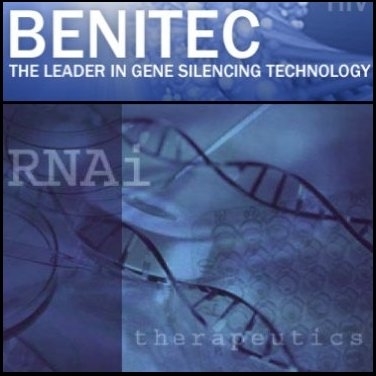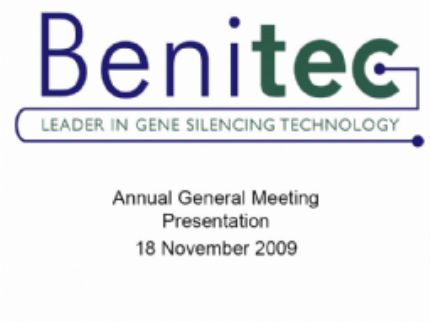
Benitec Limited (ASX:BLT) and CCIA Collaborate on an RNAi Therapeutic for Lung Cancer
Melbourne, Oct 1, 2009 AEST (ABN Newswire) - The Directors of Benitec Limited (ASX:BLT)(PINK:BNIKF) are delighted to announce a collaboration with the Children's Cancer Institute Australia for Medical Research (CCIA) for the development of an RNAi therapeutic for lung cancer. Children's Cancer Institute Australia for Medical Research is affiliated with the University of New South Wales and Sydney Children's Hospital.
Benitec has signed a term sheet with NewSouth Innovations Pty Limited, the commercial arm of the University of New South Wales, securing an option to licence patent applications on beta III-tubulin as a target for knock down using RNA interference. Associate Professor Maria Kavallaris and her team have demonstrated that using vector expressed RNA targeted at turning off beta III-tubulin results in tumours that are significantly more sensitive to a range of anti-cancer drugs.
"A/Professor Kavallaris showed that not only did turning off beta III-tubulin enhance the sensitivity to drugs which bind tubulin, but it also enhanced the sensitivity of drugs which bind to DNA. This significantly extends the potential of the RNAi approach to act as an adjuvant therapy for a range of chemotherapeutic drugs. This should be of interest to potential pharmaceutical company collaborators" said Sue MacLeman, Chief Executive Officer, Benitec Limited.
The initial proof of concept work in vitro and in vivo has already been completed. Under the agreement, A/Professor Kavallaris and Benitec will carry out further studies aimed at optimising the effect in vitro utilising Benitec's patented technology and targeting the constructs to lung tissue in vivo, with the aim of taking this to a Phase 1 clinical trial as soon as possible.
Lung cancer is the leading form of cancer worldwide in terms of incidence and mortality. Non-small cell lung cancer (NSCLC) accounts for more than 80% of all lung cancers. Beta III tubulin is a microtubule-associated protein that is significantly increased in a range of cancer cells, including non-small cell lung cancer cells.
First line therapy for NSCLC includes a combination of a tubulin-binding agent (TBA) (taxanes, vinca alkaloids) and DNA-damaging agents (platinums - cisplatin, carboplatin; doxorubicin; etoposide). The prognosis for patients with advanced NSCLC however remains dismal as the tumours rapidly become resistant to these drugs. Upregulation of the microtubule associated protein beta III-tubulin is associated with clinical resistance to these drugs, which is what makes the Benitec- CCIA approach so promising.
"This is a very exciting development and demonstrates how research conducted at the laboratory bench can be translated into better outcomes for patients," said A/Professor Kavallaris.
ABOUT CCIA
Children's Cancer Institute Australia for Medical Research (CCIA) is the only independent medical research institute in Australia devoted to research into the causes, better treatments, prevention and cure of childhood cancer. Our vision is to save the lives of all children with cancer and eliminate their suffering. Founded in 1976 by a dedicated group of parents and doctors who wanted to do something more in the fight against children's cancer, CCIA opened its first laboratory in 1984. The Institute now employs over 160 staff and students, including well over 100 scientists.
Research at CCIA comprises a multifaceted approach to improving the outcome of childhood cancer sufferers. Our research programs focus on translational research aimed at defining and achieving improved treatment for children with cancer.
Children's Cancer Institute Australia for Medical Research is affiliated with the University of New South Wales and Sydney Children's Hospital.
Contact
Sue MacLeman
Chief Executive Officer
TEL: +61-437-211-200
| ||
|




